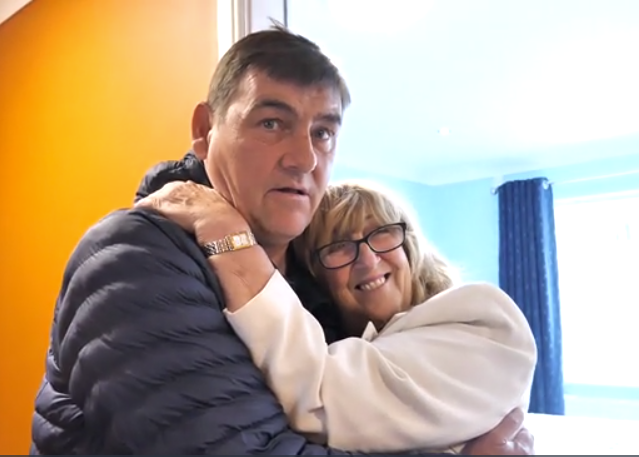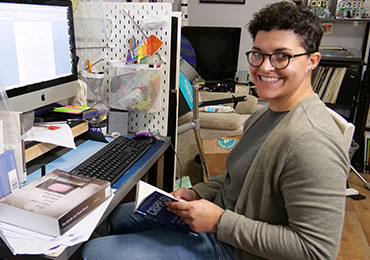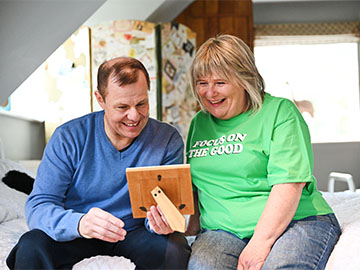Empowering Wendy’s quality of life at Maeres House!
Wendy was 28 when she found out she was expecting her first child. Like any mum-to-be, she was over the moon about the journey ahead of her and couldn’t wait to welcome her bundle of joy!
But during her pregnancy, Wendy contracted a chest infection that led to complications. As her body was busy also supporting her baby, her health became increasingly compromised. With her condition deteriorating and an unexpected prognosis from her doctors, Wendy was posed with the toughest choice an expecting mother could make.
A mother’s love
Pregnancy is a magical and emotional time, but Wendy’s illness took over her experience. Struggling to fight off her chest infection, Wendy was eventually diagnosed with encephalitis, a rare and serious condition where the brain becomes inflamed.
With a while to go until her due date, Wendy’s doctors were unsure how the condition would affect her once her baby was born. But they knew her condition might keep deteriorating if she continued with her pregnancy.
With this in mind, Wendy was given the option to end her pregnancy and live with less severe complications. Or, she could have her baby without knowing the impact it might have on her health.
Wendy didn’t have to think twice and gave birth to a healthy baby girl. With the start of her daughter’s life, came the start of a new journey for Wendy.
A new home life
After being discharged from hospital, Wendy returned home with her new baby, but she soon started to present symptoms that suggested her encephalitis was becoming more serious.
With significant memory loss, Wendy couldn’t care for her daughter in the way she naturally wanted to and Wendy’s husband unexpectedly found himself caring for their little girl on his own.
Life had changed dramatically for Wendy. Before her pregnancy, she worked as a hairdresser and lived a regular, quiet life in the North West of England. Yet after the birth of her daughter, she struggled to overcome encephalitis and was unable to perform simple daily tasks, such as washing and dressing.
But Wendy wouldn’t have changed anything – having a healthy and happy baby was all she wanted. From the moment she was diagnosed, Wendy put her baby first and accepted she might not be the person she once was.
Suffering irreversible symptoms, Wendy now needed round the clock care and her family knew they needed help to give Wendy a better quality of life.
The road to Voyage Care
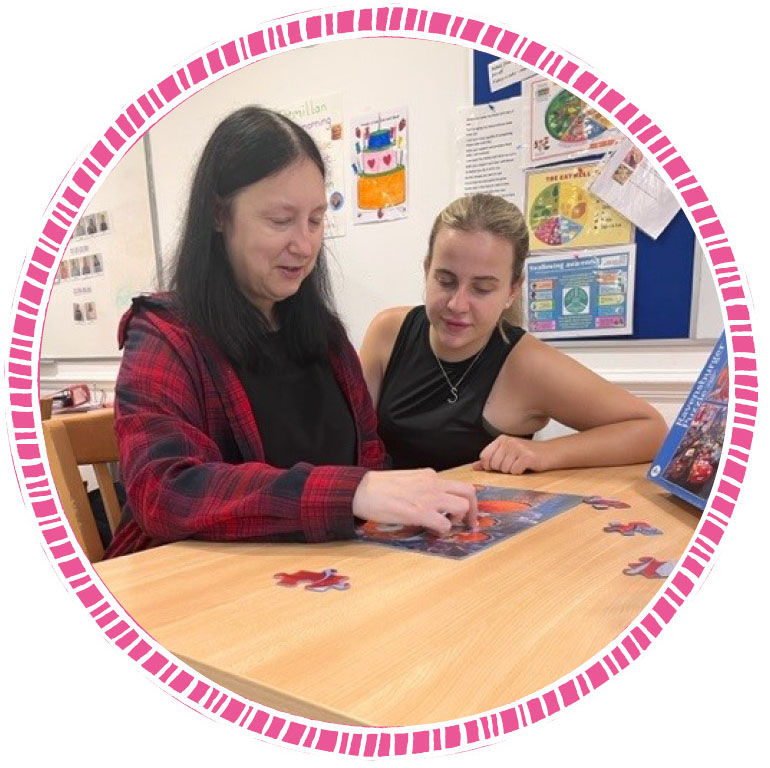
Wendy moved out of her family home to begin her rehabilitation journey. Her previous provider placed her in an all-male unit, and her family quickly recognised her needs weren’t being met. Wendy’s placement was also far away from her family, which inhibited her progress.
After an assessment with our specialist brain injury rehabilitation team, we knew we could support Wendy on her rehabilitation journey and help her to rediscover who she was.
Securing a place at Maeres House, Wendy’s family were reassured knowing she would now receive dedicated care tailored to her needs by an expert support team. Plus, she would be closer to her family – something that was important to Wendy.
Once she was ready to move in, her new support team helped her navigate the transition from her old home in order to empower Wendy’s quality of life. After Wendy settled into her new home, her team set to work co-creating a tailored support plan with her, putting her needs and wishes at the heart of her support.
Life at Maeres House
As soon as she arrived at Maeres House, Wendy’s team knew living a rich and varied life was important to her progression and happiness.
Wendy was instantly a vibrant addition to the household! But with memory loss and changes to her cognitive function, Wendy’s team needed additional support to help her access activities in the community.
They started with prompts to encourage Wendy to do things for herself. For tasks where she needed more support, like showering, her team talked her through the process step-by-step, to trigger her memory.
Establishing a routine was beneficial during this time in supporting to improve Wendy’s memory. Her team helped her to create a daily schedule and alongside prompts, she started to associate different activities with certain times of the day. By providing a visual structure of her day, Wendy’s memory started to improve.
Alongside this, Wendy’s team engaged her with their resident Occupational Therapist. After getting to know Wendy, the therapist suggested designing their sessions around improving her memory. Asking questions encouraged Wendy to think about the world around her and provided essential stimulation.
Quality care and support
As part of her condition, Wendy also presents impulsive behaviours. At first, these were frequent and risked putting her in danger in the community. For her to access opportunities in the local area, Wendy’s team understood the importance of helping her to rebuild awareness of her surrounding environment.
Step-by-step, they supported Wendy to explore the environment outside her home. Using verbal prompts and visual cues, they supported Wendy to understand potential dangers in the community and how to stay safe when crossing the road, for example.
Accompanied by her Support Workers, she can now enjoy her favourite hobbies, empowering Wendy’s quality of life. Regularly spotted at the Trafford Centre, she loves shopping trips with her support team! She’s also a music lover. Not only can you hear her filling the halls of Maeres House with lively songs, you can also find her at the local theatre enjoying musicals, or at the cinema for popcorn and a rom com!
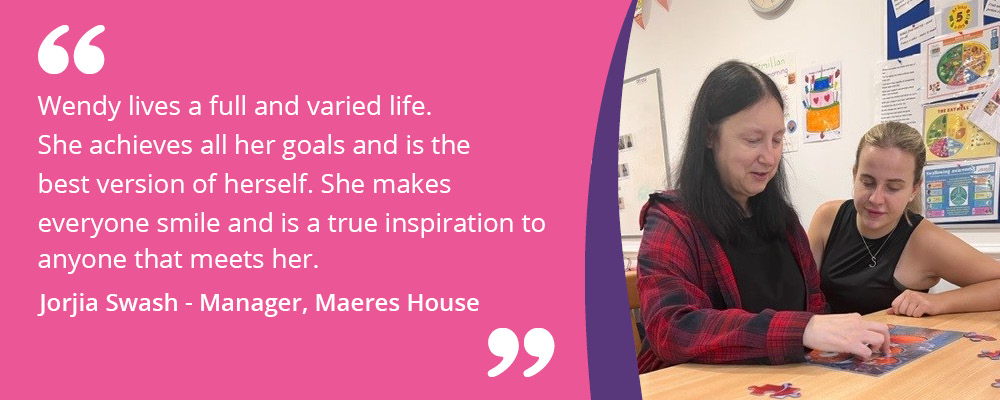
Empowering a healthy lifestyle
Wendy’s come a long way on her rehabilitation journey. Supported to make her own decisions, her support team encouraged her to pursue her passions. So, when Wendy expressed she wanted to eat healthier, her team worked with her to achieve this.
Discovering more about what Wendy used to eat at home, they reintroduced her to the foods she loved. Together, they co-create weekly meal plans, shopping lists, and venture out to the shops to stock up on everything Wendy needs to remain healthy.
Wendy’s team respect her decision to keep fit and healthy. An advocate for home cooking, Wendy was keen to get back in the kitchen and whip up her favourite dishes. With the support of her team, she’s redeveloping her cooking skills and can often be found in the Maeres House kitchen, cooking a cottage pie, or baking brownies!
Part of the family
From day one, Wendy’s team at Maeres House took the time to get to know her as an individual. Showing her compassion and treating her with respect, they’ve gained Wendy’s trust and built meaningful relationships with her. This has been important to how far she’s progressed on her rehabilitation pathway.
Although Wendy may never fully recover from her condition, she’s built a wonderful life at Maeres House, where she’s truly the life and soul of the family.
Find out more
To find out more about our specialist brain injury support and how we can help you, a loved one, or a client, fill out our simple enquiry form and a member of our team will be in touch.

 Brain injury rehab
Brain injury rehab  More success stories
More success stories 